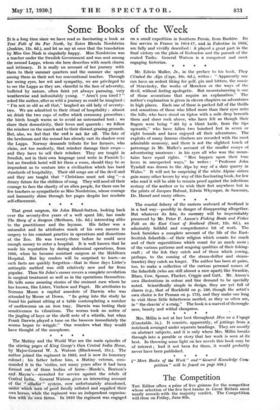That great surgeon, Sir John Bland-Sutton, looking back over the
seventy-five years of a well spent life, has made The Story of a Surgeon (Methuen, 12s. 6d.) interesting alike to the practitioner and the layman. His father was a naturalist and he attributes much of his own success in surgery to his constant practice in operations and dissections at : the Zoo. He was twenty-three before he could save enough money to enter a hospital. It is well known that he made his reputation by daring abdominal operations, from 1886, when he became assistant surgeon at the Middlesex Hospital. But lay readers will be surprised to learn—as such facts are quickly forgotten—that in those days Lister's antiseptic method was still relatively new and far from popular. Thus Sir John's career covers a complete revolution in surgical treatment as well as in the operations themselVes. He.: tells some amusing stories of the eminent men whom 'he has known, like Lister, Virchow and Paget. He attributes to Norman Moore a capital anecdote of Darivin who was attended by Moore at Down. " In going into the study he found his patient sitting at a table contemplating a number of earthworms on an iron tray. Darwin was testing their sensitiveness to vibrations. The worms took no notice of the jingling of keys or the shrill note of a whistle, but when Frank Darwin played a tune on the bassoon immediately the worms began to wriggle." One wonders what they would have thought of the saxophone.














































 Previous page
Previous page